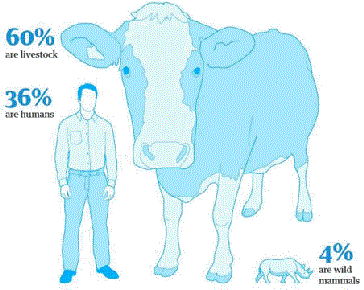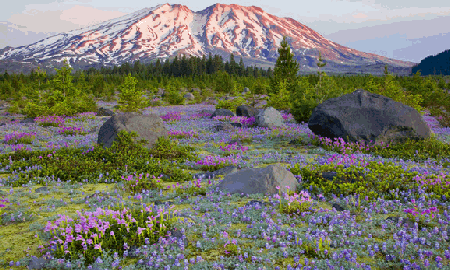'Life is either a great adventure or it is nothing.' Helen Keller, who was deaf and blind, wrote 20 books and traveled the world. Therefore anything must be possible
'With all its sham, drudgery and broken dreams, it is still a beautiful world.' Desiderata
Modern human culture as it currently exists is not sustainable, even in the near term. Why?

Click the image to enlarge
|
1) The natural world is disappearing; 96% of the biomass of mammals on Earth consists of humans and livestock, 4% is wildlife.
2) The physical and biological systems that make life possible are being severely damaged, for example the destruction of tropical forests, which cycle oxygen and water into the atmosphere utilize carbon dioxide.
3) The current levels of energy consumption by modern human society cannot be maintained much longer. The world currently uses 100 million barrels of oil a day, but peak discovery of oil occurred in 1962. All of the 'supergiant' fields are gone; we are now basically 'licking the plate' in terms of accessing petroleum. Also, the net energy of all fossil fuel sources (energy return on energy invested, EROEI) is falling.
4) Renewable energy is not renewable without fossil fuels, it is also not 'energy dense' in the way fossil fuels are.
5) The human population, which was under one billion for 200,000 years, has grown to 8 billion in the last 200 years, and is still growing by 200,000 a day, 80 million a year. The global human population has already exceeded the planet's carrying capacity for our species. The climate crisis is just one symptom of this underlying 'ecological overshoot.' The singular focus on climate change neglects this systemic nature of the larger problem.
So, the adventure and the assignment is to move towards an ecologically based, sustainable society. Obviously it is possible to live well on Earth; humans have been here for 200,000 years, and there are millions of other species living here successfully as well.
Some Critical Points
1. Earth is overpopulated with Homo sapiens; many ecologists suggest a sustainable human population level is one billion people or less.
2. The U.S. war machine must be dismantled; the U.S. spends about one trillion dollars a year on preparation for and conducting wars around the globe, damaging human societies and natural ecosystems and squandering precious resources. The world's 13,000 nuclear weapons, some of which are on hair-trigger alert and could be fired in minutes, must also be dismantled. The war machine and these weapons will only disappear when enough individuals live ethically and refuse to pay for and otherwise support such globally destructive behavior.
3. Interest-bearing economics, and the perpetual growth model that it requires, is neither ecologically sustainable nor ethical. We should not make money by investing money.
4. Food production currently burns ten calories of fossil fuels to produce one calorie of food. One scientist noted 'Modern agriculture is a means of turning petroleum into food.' This will not be possible in the future. Food production must be relocalized and must abandon its dependence on fossil fuels. Ecosystems produce abundant biomass without fossil fuels and ecological gardens and farms can do the same.
How to Move Towards a Sustainable Culture

Mt. St. Helens: life after death
Click the image to enlarge
|
1. Learn how nature works: energy comes from the sun on a daily basis, all resources were delivered when the earth formed 4.5 billion years ago and must therefore be constantly cycled. There is no waste in nature. There is a carrying capacity (limit) for every species. Observe all this in natural ecosystems.
2. Plant a garden, build soil just as nature does, increasing biomass with cover crops. Compost & cycle the nutrients that give you your body and your life energy. Any true ecologist would want to recycle their humanure. As Joseph Jenkins, the author of The Humanure Handbook writes, 'Some people go to church on Sunday, others make compost.'
3. Use ecologist Paul Ehrlich's formula I = PAT (impact = population x affluence x technology) to study how to reduce human impact on our ecosystems. Simply reduce any or all of the three multipliers to reduce our impact on the Earth.
4. Visit and learn from ecologically knowledgeable people, but be sure they understand 'overshoot,' that the human population has overshot its carrying capacity. Otherwise their work is meaningless (for example fisheries and wildlife biologists trying to restore salmon or megafauna without addressing the bloated and still growing human population).
For more on sustainable human culture see The Real Green New Deal.
|
ABOUT THE AUTHOR
Dana Visalli is a professional botanist and small organic farm operator living in northcentral Washington. He has lived off-grid for the past 20 years, and finds using his composting toilet to be a ‘deep ecology’ moment. Observing the dictum 'War is god's way of teaching geography,' he has traveled to America's war zones -- to Iraq four times, Afghanistan four times, Russia three times, Vietnam, Laos, Cuba, and Syria-- to study geography.
|